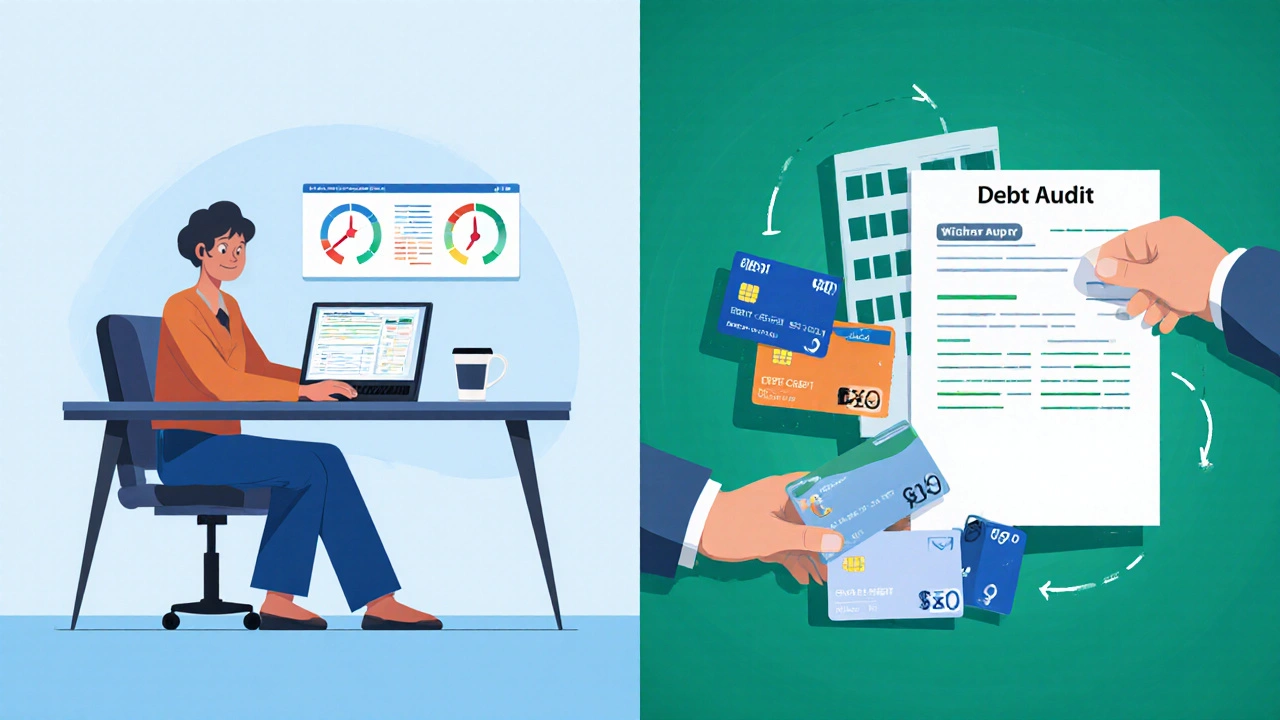Credit Card Consolidation Impact Calculator
Personal Loan
Fixed payments, unsecured
Balance Transfer
0% intro rate, short-term
Home Equity
Secured, low rates
Consolidation Impact Analysis
Credit Card Impact
- Card closure risk: Low
- Utilization improvement: Significant
- Credit history preservation: Yes
Credit Score Impact
- Initial dip: Minimal
- Recovery time: 3-6 months
- Long-term improvement: Likely
Key Insights
- Consolidation typically does not force card closures
- Keeping cards open preserves credit history and limits
- Lower utilization ratios boost credit scores
- Plan ahead to avoid common pitfalls
If you’re juggling multiple credit‑card balances, the idea of debt consolidation can feel like a lifeline. But a common worry pops up: will the banks pull my cards once I bundle everything into one loan? The short answer is no - you don’t automatically lose your cards - but the process can reshape your credit profile, affect card terms, and influence future borrowing.
Key Takeaways
- Consolidating debt doesn’t force credit‑card closures, but lenders may request you close or suspend cards as a condition.
- Your credit‑score impact depends on how you handle utilization, payment history, and new credit inquiries.
- Choosing the right consolidation product (personal loan, balance‑transfer, or home‑equity line) matters for cost and card usage.
- Follow a clear step‑by‑step plan to keep cards open, protect your score, and improve cash flow.
- Avoid common pitfalls like closing high‑limit cards too early or missing the first payment on the new loan.
Understanding Debt Consolidation
Debt consolidation is a financial strategy that combines several high‑interest debts-usually credit‑card balances-into a single loan or credit line with a lower interest rate and a structured repayment schedule. By simplifying payments, borrowers can reduce monthly outflows, cut overall interest costs, and gain a clearer picture of their debt burden. The main routes are:
- Unsecured personal loans from banks or online lenders.
- Balance‑transfer credit cards offering an introductory 0% APR.
- Home‑equity loans or lines of credit that use your property as collateral.

How Credit Cards Are Affected
When you start a consolidation plan, your existing credit cards revolving accounts that let you borrow up to a set limit each month and pay interest on any balance you carry remain technically active unless you or the issuer decide otherwise. Here are the three ways they can change:
- Utilization Shift: Moving balances to a loan reduces the amount owed on each card, lowering your credit utilization ratio-a key factor in credit score a numeric representation of creditworthiness based on payment history, amounts owed, length of credit history, and other factors. A lower ratio generally boosts your score.
- Lender Conditions: Some lenders, especially those offering low‑interest personal loans, may ask you to keep the cards open but not use them, or they might request you close a card to prevent re‑accumulating debt. This is a contractual condition, not an automatic outcome.
- Future Access: If you close a card, you lose its credit limit, which can raise overall utilization and shorten your credit history-both negatives for the score. Keeping the card open, even with a $0 balance, maintains the limit and history.
Types of Consolidation Options
| Product | Typical Interest Rate (NZD) | Secured? | Impact on Credit Cards | Best For |
|---|---|---|---|---|
| Personal Loan an unsecured loan with fixed monthly payments | 6%-12% | No | May require you to keep cards open but unused; some lenders ask for a card‑closure clause. | Stable income, want predictable payments. |
| Balance‑Transfer Card a credit card that lets you move existing balances at a 0% introductory rate | 0% intro (6-12 months), then 15%-22% | No | Usually keeps the original cards open; you’ll have a new card to manage. | Short‑term pay‑off ability, need discipline. |
| Home‑Equity Loan a secured loan using your property as collateral | 4%-8% | Yes | Often allows you to close cards after transfer; risk of foreclosure if you default. | Homeowners with equity, looking for the lowest rate. |
Pros and Cons of Consolidating Without Losing Cards
Below are the main advantages and potential downsides of keeping your cards after a consolidation move.
- Pros:
- Maintains credit limit, protecting utilization ratio.
- Preserves length of credit history, which is a positive scoring factor.
- Provides a safety net for emergencies if you keep a low‑interest card open.
- Cons:
- Temptation to rack up new balances, undoing the consolidation benefit.
- Some lenders may charge a higher fee if you keep high‑limit cards open.
- Potentially higher overall credit limit could encourage overspending.

Step‑by‑Step Guide: Consolidate While Keeping Cards Open
- Audit Your Debt: List every credit‑card balance, interest rate, and monthly payment. Use a spreadsheet to see total debt and average rate.
- Check Your Credit Score: Pull a free report from a reputable New Zealand bureau. Knowing your score helps you qualify for better rates.
- Shop for the Right Product: Compare personal‑loan offers, balance‑transfer cards, and home‑equity options. Look at APR, fees, repayment term, and any conditions about existing cards.
- Apply and Secure Funding: Once approved, lock in the loan or transfer. For balance‑transfer cards, complete the transfer within the promotional window (usually 30-45 days).
- Pay Off the Cards: Use the new loan funds to clear each credit‑card balance. Keep the cards active but set a $0 balance.
- Freeze Card Activity (Optional): If you fear temptation, contact the issuer and ask them to temporarily disable new purchases while keeping the account open for credit‑history purposes.
- Set Up Automatic Payments: Link the consolidation loan to your bank account and schedule monthly auto‑debits to avoid missed payments.
- Monitor Your Score: Watch for changes over the next 3-6 months. A drop may occur initially due to the new inquiry and loan, but it should recover as utilization improves.
Common Pitfalls and How to Avoid Them
- Closing High‑Limit Cards Too Soon: If you close a card with a large credit limit, your overall utilization spikes, hurting your score. Keep the account open for at least a year after consolidation.
- Missing the First Payment: Lenders often charge a late‑fee and the interest rate may jump. Set reminders or automate the payment.
- Taking on More Debt: A common trap is using the newly‑available credit to make new purchases. Treat the cards as “reserve” accounts only.
- Choosing the Wrong Product: A balance‑transfer card with a short intro period may lead to higher rates if you can’t pay off the balance quickly. Match the product length to your repayment ability.
Frequently Asked Questions
Will the lender automatically close my credit cards?
No. Lenders can request you keep cards open, ask you to limit usage, or in rare cases add a clause to close a specific high‑risk card, but they cannot close them without your consent.
How does consolidation affect my credit score?
Initially, a hard inquiry and new loan can cause a small dip (5‑10 points). As you pay down the loan and lower credit‑card utilization, the score typically rebounds and often climbs higher than before.
Can I use a balance‑transfer card and still keep my original cards?
Yes. The balance‑transfer card is a new account. Your old cards stay active unless you choose to close them. Just avoid new spending on those older cards.
What if I default on a home‑equity loan?
Because the loan is secured by your property, default can lead to foreclosure. That’s why a home‑equity product should only be used if you’re confident in meeting payments.
Should I close a credit card after I’ve paid it off?
Generally keep it open for at least a year. Closing it reduces total available credit and can shorten your average account age, both of which may lower your score.
Consolidating debt is a powerful tool, but it works best when you understand how it interacts with your credit‑card ecosystem. By choosing the right product, honoring any lender conditions, and keeping your cards strategically open, you can lower interest costs, protect your credit score, and move toward a debt‑free future.

